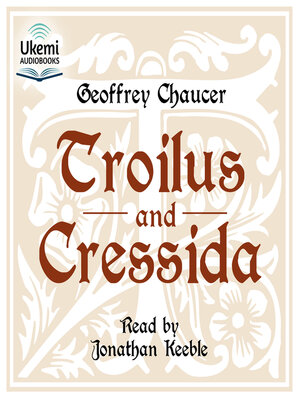
Sign up to save your library
With an OverDrive account, you can save your favorite libraries for at-a-glance information about availability. Find out more about OverDrive accounts.
Find this title in Libby, the library reading app by OverDrive.



Search for a digital library with this title
Title found at these libraries:
| Loading... |
Considered one of Chaucer's finest poems, second only to The Canterbury Tales in richness and depth, Troilus and Cressida is a tragic love story set against the background of the siege of Troy by the Greeks. Written in the 1380s, it presents Troilus, son of Priam and younger brother of Hector, as a Trojan warrior of renown who sees, and falls deeply in love with, the beautiful Cressida. Cressida is the daughter of Calchas, a Trojan priest and seer who, having divined the eventual fall of Troy, has deserted to Agamemnon's camp, leaving his daughter in the besieged city. With the help of Pander, friend to Troilus and uncle to Cressida, the young couple meet and merge - but with unhappy consequences. Chaucer's long poem is cast in seven-line rhymed stanzas and is eased out of Middle English to be presented here in a lively modern verse translation by George Philip Krapp, who has retained not only the structure but its spirit. Emotions run high, the love is intense, the story unfolds with a dramatic urgency that draws the listener ever onwards; yet Chaucer is Chaucer, and there are times when a deft line, a light insinuation, suggests the smile, the benevolence and the immediacy of the author of The Canterbury Tales. Troilus and Cressida, though often overshadowed by the Tales and time (and even Shakespeare, who took up the story) is a monument in its own right in the canon of English literature. Once listened to it will never be forgotten.






